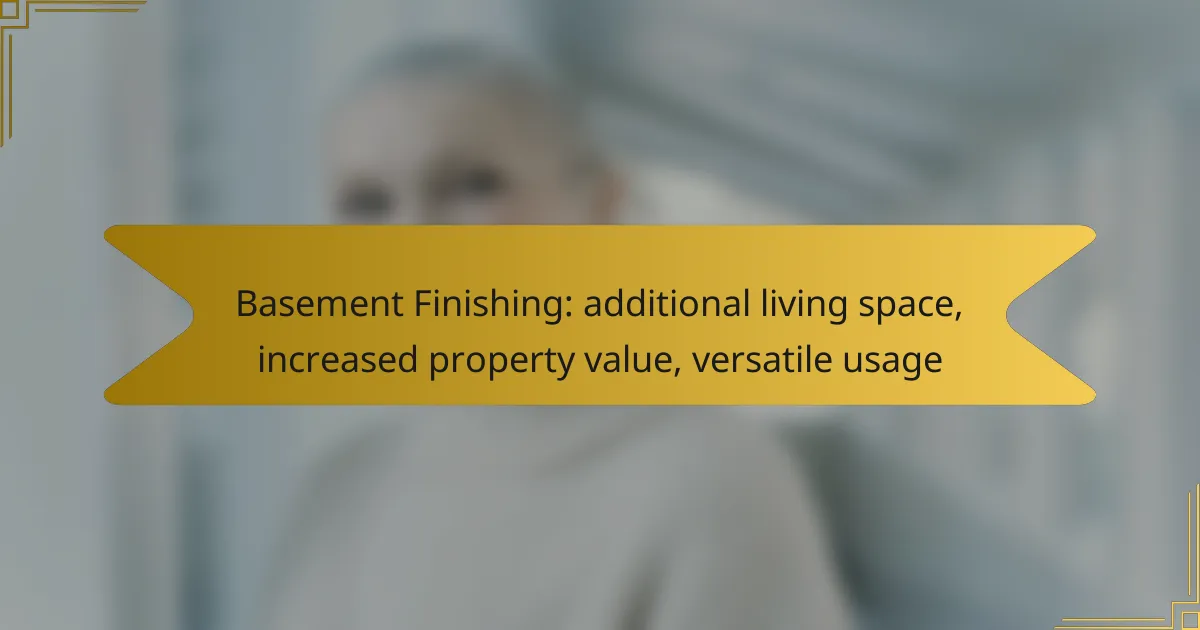Finishing a basement is an effective way to transform an underutilized area into valuable living space, significantly enhancing both the functionality and comfort of your home. This renovation not only increases the overall square footage but also boosts property value, making it more appealing to potential buyers. With versatile options for usage, a finished basement can serve as a home office, entertainment area, or guest accommodation, catering to diverse needs and lifestyles.

How can basement finishing create additional living space?
Basement finishing transforms an underutilized area into functional living space, significantly enhancing the overall usability of a home. By converting a basement into a livable area, homeowners can create rooms for various purposes, effectively increasing their property’s value.
Increased usable area
Finishing a basement adds substantial square footage to a home, often turning it into an additional bedroom, office, or recreational area. This increase in usable area can be particularly beneficial in urban settings where space is limited and property values are high.
Homeowners should consider local building codes and regulations when planning a basement finish, as these can affect the total usable area. Proper insulation and ventilation are also crucial to ensure comfort and compliance with safety standards.
Flexible room configurations
One of the key advantages of a finished basement is the flexibility it offers in room configurations. Homeowners can design the space to suit their specific needs, whether that means creating a guest suite, a home gym, or a playroom for children.
When planning the layout, consider how the space will be used over time. Modular furniture and movable partitions can help adapt the area for different activities, making it a versatile addition to the home.
Enhanced family functionality
A finished basement can significantly enhance family functionality by providing a dedicated space for various activities. This can help reduce clutter in the main living areas and create a more organized home environment.
For example, a basement can serve as a family entertainment center, a quiet study area, or a hobby room. By designating specific areas for different activities, families can enjoy a more harmonious living experience while maximizing the benefits of their home.

What are the benefits of basement finishing for property value?
Finishing a basement can significantly enhance property value by transforming unused space into functional living areas. This improvement not only increases the overall square footage but also appeals to potential buyers looking for additional amenities.
Higher resale value
A finished basement can boost a home’s resale value by a notable percentage, often ranging from 10% to 20% depending on the local market. This increase is due to the added livable space that buyers find attractive.
Investing in quality finishes and proper insulation can further maximize this value. Homeowners should consider the cost of renovations against potential returns when planning their projects.
Attractiveness to buyers
Homes with finished basements tend to attract more buyers, especially families seeking extra rooms for activities, guest accommodations, or home offices. A well-designed basement can serve multiple purposes, making it a versatile selling point.
Features like natural light, proper ventilation, and stylish design elements can enhance the appeal. Highlighting these aspects during showings can significantly influence buyer interest.
Marketability in urban areas
In urban areas where space is limited, a finished basement can be a key differentiator in the real estate market. Buyers often prioritize homes that maximize usable space, making a finished basement a valuable asset.
Additionally, urban properties with finished basements can command higher rental prices if homeowners choose to rent the space. This potential for income can further enhance the property’s attractiveness to buyers looking for investment opportunities.

What versatile uses can a finished basement serve?
A finished basement can serve multiple purposes, enhancing both functionality and comfort in your home. It can be transformed into a home office, entertainment area, or guest accommodation, providing valuable additional living space that meets various needs.
Home office setup
A finished basement is an ideal location for a home office, offering a quiet and dedicated space away from the main living areas. Consider factors like natural light, ventilation, and soundproofing to create an effective work environment.
When designing your home office, invest in ergonomic furniture and adequate storage solutions. Ensure that your internet connection is reliable, as this will be crucial for productivity. A well-organized workspace can significantly enhance your work-from-home experience.
Entertainment area
Transforming your basement into an entertainment area can provide a fun space for family and friends. This could include a home theater, game room, or lounge area, depending on your preferences and available space.
Consider installing comfortable seating, a large screen for movies or gaming, and soundproofing materials to enhance the experience. Adding a mini-fridge or snack bar can also make the space more inviting for gatherings.
Guest accommodation
A finished basement can serve as a cozy guest accommodation, offering privacy and comfort for visitors. Ensure that the space includes essential amenities like a bathroom, a comfortable bed, and adequate lighting.
To make the area more welcoming, consider adding personal touches such as fresh linens, toiletries, and a small seating area. This setup not only provides your guests with a pleasant stay but also maximizes the use of your home’s square footage.

What are the costs associated with basement finishing?
The costs associated with basement finishing can vary widely based on several factors, including the size of the space and the quality of materials used. On average, homeowners can expect to spend several thousand to tens of thousands of dollars to transform an unfinished basement into a livable area.
Average price per square foot
The average price for finishing a basement typically ranges from $30 to $100 per square foot, depending on the complexity of the project and the materials chosen. For example, a basic finish with standard materials might cost around $30 to $50 per square foot, while high-end finishes can reach $100 or more.
Homeowners should consider the total square footage of their basement when estimating costs. A 1,000 square foot basement could therefore cost anywhere from $30,000 to $100,000 based on these averages.
Factors affecting overall cost
Other considerations include permits and inspections, which may be required depending on local regulations. It’s advisable to budget for these additional costs, as they can add several hundred to thousands of dollars to the project.

What are the essential steps in the basement finishing process?
The basement finishing process involves several key steps that transform an unfinished space into a functional living area. These steps include planning and design, obtaining necessary permits, and executing construction with finishing touches.
Planning and design
Effective planning and design are crucial for a successful basement finishing project. Start by determining the purpose of the space, whether it’s a family room, home office, or guest suite. Create a layout that maximizes the available square footage while ensuring proper flow and accessibility.
Consider essential elements such as lighting, ventilation, and insulation. These factors not only enhance comfort but also comply with local building codes. Sketching a detailed floor plan can help visualize the final outcome and guide material selection.
Permitting and inspections
Before construction begins, it’s important to secure the necessary permits from local authorities. This may include building permits, electrical permits, and plumbing permits, depending on the scope of your project. Check with your local government to understand specific requirements and fees.
Inspections are typically required at various stages of the project to ensure compliance with safety standards. Schedule these inspections promptly to avoid delays and ensure your finished basement meets all regulations.
Construction and finishing touches
The construction phase involves framing, drywall installation, and flooring, among other tasks. Hire qualified professionals for complex jobs like electrical and plumbing work to ensure safety and quality. Use moisture-resistant materials to prevent issues in the future.
Once the main construction is complete, focus on the finishing touches. This includes painting, installing trim, and adding fixtures. Consider energy-efficient lighting options to reduce long-term costs. Finally, furnish the space according to its intended use, creating a welcoming and functional environment.
